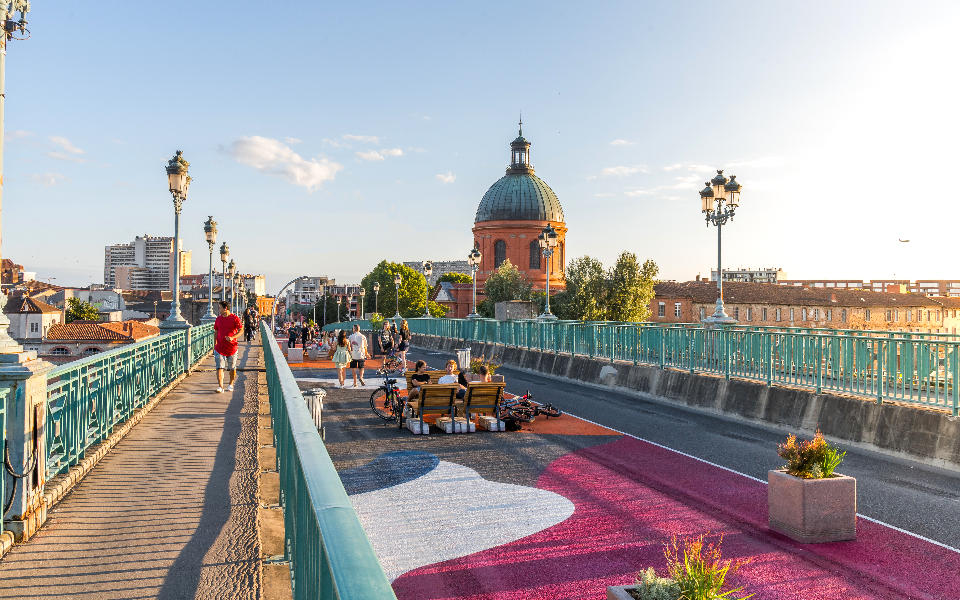Visit Toulouse: Why there’s more to Rugby World Cup hosts than just sport

Bistros, cafes, wine bars, Gothic architecture and brilliant food, there’s more to Toulouse than the Rugby World Cup
Toulouse is the heart of French rugby. The local team – Stade Toulousain – is the most successful in Europe, with five European championship wins and 22 French championship titles. Between a quarter and a third of France’s national team plays for Stade Toulousain or came through its academy, including the current captain, Antoine Dupont. So it makes sense that the city is hosting five games of the Rugby World Cup.
It might seem odd that a city in southwest France would be the driving force of a sport from England’s private schools. But a lot about Toulouse is unusual. Unlike many French cities, Toulouse is not full of wide boulevards or vast administrative buildings in the Imperial and Republican white stone style. Instead, it has retained its medieval city centre, and its buildings are made of red bricks, fired from the clay of the Garonne River that runs through the city.
These bricks glow pink in the evening sunshine, giving Toulouse its moniker. The winding backstreets feel more like southern Italy than France, and as I weaved back and forth past half-timbered buildings, magnificent treasures were suddenly revealed. The hulking Church of the Jacobins is built in the ‘Southern Gothic’ style, and the outside looks like a vast ship prowling through the city. But its interior is decorated with columns that look like palm trees, and the windows along the nave progress through the colours of the rainbow.

The epicurean joy of Toulouse’s backstreets lives in the vast array of bistros, cafes and wine bars that pop out of every nook and cranny. Hole-in-the-wall spots like Bistro Des Carmes serve up local delicacies of cassoulet (a sausage, bean and confit-duck stew) or crisp, fatty Magrets de Canard (duck breasts), all washed down with wines from the nearby Fronton appellation [wine-growing region]. Fronton is just 15 minutes from Toulouse by train, and sits on a plateau between the Tarn and Garonne rivers. Its specialty is the local négrette grape.
“The closest common grape is Malbec,” said Nicolas Roumagnac, of Domaine Roumagnac, “Red and black fruit, spicy, liquorice. It goes well with the local Occitanic dishes because they kind of grew up together – the wine was made to complement the food of the region. The appellation nearly dropped négrette because it’s hard to look after, until they realised that it’s central to our identity. It’s often blended, but you are starting to see more single varietal bottles that express its identity more clearly.”
Négrette is used for Fronton rosé; the grapes’ near-black skin makes it darker than Provence rosés, but it is dry, with hints of strawberry, liquorice spice, and violets. That makes for a deliciously rounded and balanced wine, and the local Ines Fronton has twice-won the ‘Best Rosé in France’ award. ‘Négrette’ is an Occitan word – the language of Toulouse and the surrounding region, which has much in common with Catalan.
Read more: Italy: Why Lucca in Tuscany is the cultural holiday you need to book
It’s part of the region’s distinct identity, and Toulouse has a sense of the counter-cultural, with street-art and graffiti being tolerated and celebrated across the city. It’s also the home of France’s aerospace industry, and these two strands come together at The Halles Des Machines, an interactive museum that feels like a steampunk village fête. There’s a gigantic mechanical minotaur and flame-throwing musical instruments that are demonstrated by circus performers, but I tried my hand at the firecracker shooting range.
I liked Toulouse. Good food and wine is both accessible and affordable, and the people are both friendly and welcoming. If you are looking for a relaxed French city break, it’s hard to beat. Much like the local rugby team.
For more information, go to: toulouse-visit.com; the Rugby World Cup continues until 28 October